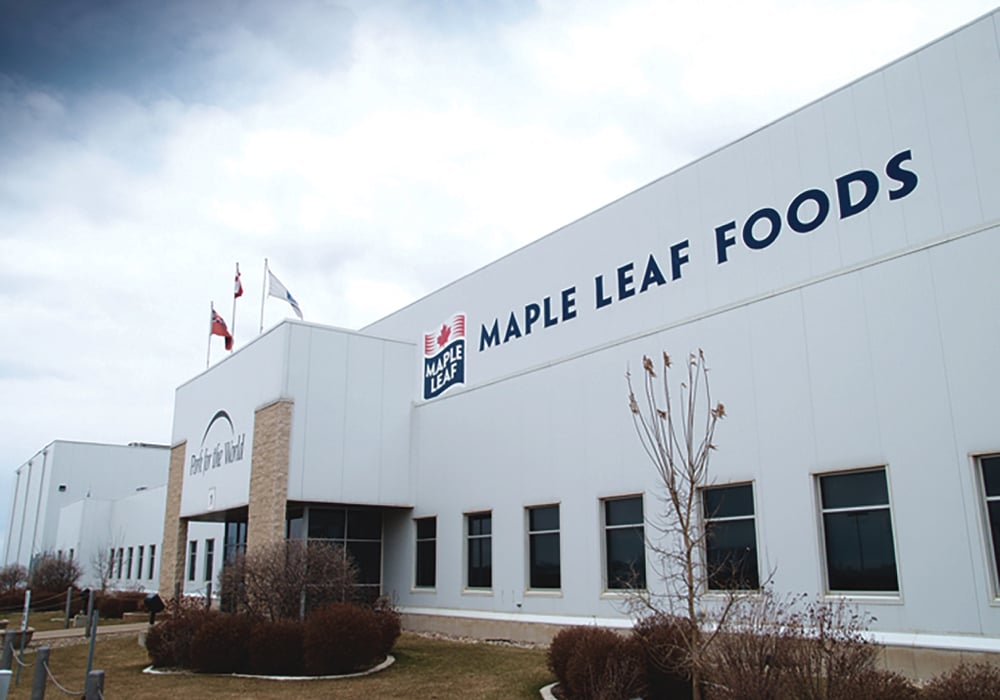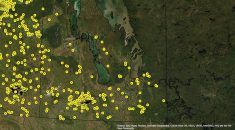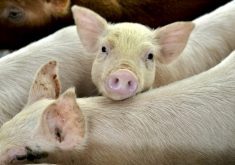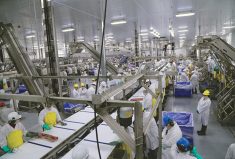The union representing workers at Brandon’s Maple Leaf Foods plant says it’s seeing echoes of Alberta.
Late last week, United Food and Commercial Workers (UFCW) Local 832 pushed Maple Leaf Foods to close the pork plant after eight workers tested positive for COVID-19.
Why it matters: Until now, Manitoba’s meat processors have largely dodged the disruptions from COVID-19 seen elsewhere in North America, but now a cluster of cases in Brandon’s Maple Leaf Foods pork plant is threatening that track record.
Read Also

University of Manitoba honours three agriculture alumni
Cathey Day, Fred Greig and Kim McConnell were chosen for the University of Manitoba’s 2025 certificates of merit from the agricultural and food sciences faculty.
The first case was reported over the August long weekend. The packer said the employee in question had last been in the plant July 28, and that staff who were in contact with the employee had been asked to self-isolate. The company said a deep clean of the plant had also taken place over the weekend.
By Aug. 6, word of a further three cases had come to light, followed by another four the following day. Union president Jeff Traeger estimated roughly 80 staff had been asked to self-isolate at that time and about half of those were awaiting test results.
After the cases reported Aug. 6, UFCW Local 832 called for the plant to close until at least Aug. 10. Cases the following day led the union to reiterate calls for a closure, “until this situation is under control.”
“We learned the lessons elsewhere,” Traeger said. “In Alberta, they ended up not doing that… and then a week later there were 940 cases and now there’s a lawsuit against the company for those who lost family members who worked there. We’re trying to prevent a very bad situation and having a hard time understanding the real rationale behind why they won’t shut this plant down for a period of time.”
In April, COVID-19 cases at Cargill’s High River beef facility prompted the packer to shut down for two weeks, something that sent ripples through beef markets as cattle backed up to the farm gate. The outbreak was eventually linked to about 1,500 cases, 940 of which were plant staff, along with several deaths.
In early July, a class-action lawsuit was filed against the company.
Closures and slowdowns at processing plants also impacted the meat sector elsewhere. Another Alberta beef packer, JBS, was forced to slow production after several staff tested positive for COVID-19, while the temporary closure of an Olymel pork plant in Quebec, in conjunction with major plant closures in the U.S., sent similar shock waves through the pork market. As of the end of May, the Canadian Pork Council estimated that backlogs in Ontario and Quebec sat at 100,000 pigs, while farm losses were being estimated at $30 per hog sold in 2020.
Precautions taken
Maple Leaf Foods was resisting the closure as of Aug. 7.
In an emailed statement to the Manitoba Co-operator the company said it would “continue to operate our Brandon plant as long as we believe we can provide an environment that will protect the safety of our people while working.”
The packer has cited its regular measures against spread of the virus, including daily temperature and health checks, social distancing, Plexiglas barriers on the production line, and protective equipment for staff.
The company further pointed to an inspection Aug. 6, when provincial health authorities and the Canadian Food Inspection Agency were invited by Maple Leaf Foods to assess the plant.
“The outcome of this inspection was a positive reinforcement of the rigorous steps Maple Leaf Foods is taking to provide a safe work environment and prevent workplace spread of COVID-19, including barriers, ventilation, distancing, screening, monitoring and enforcement protocols,” a statement from the company read. “As a result, Public Health and CFIA officials support our decision to continue operating.”
The invitation followed the union’s calls for such an inspection. UFCW Local 832 previously drafted a letter to Cameron Friesen, minister of health, seniors and active living, requesting the inspection, although the health minister was reluctant to promise that measure at the time.
“I didn’t see the benefit in the case of this particular letter that was trying to out the employer or to somehow suggest that there were more cases that couldn’t be verified,” Friesen said Aug. 6. “The work that Public Health does is very important to verify and validate and that cannot be taken for granted. Accurate information, timely information — we’re all in this together. We’re going to leave it to the public health experts to make those determinations about safety.”
The union said it was pleased that an inspection occurred, but that it did not alter its calls for a shutdown.
Traeger also noted that the only information out of that inspection as of Aug. 7 had come from the company. The union has said it will get copies of inspector reports, but had not received a timeline as of print time.
Traeger, meanwhile, criticized the province’s response to its initial request.
“I and UFCW have the safety of all the people working at that plant first and foremost in mind and I’m now officially wondering whether our minister of health does, or if he’s more concerned with the economy, which seems to be the trademark of this government,” he said.
Ounce of prevention
Maple Leaf Foods says the cases are linked to exposure in the community, despite provincial messaging, which has downplayed the risk of community spread.
Manitoba chief public health officer, Dr. Brent Roussin said that 25 of 30 new cases reported Aug. 6 were linked to existing positive results and that, although the province was tracking a cluster of cases in Brandon — which had accounted for all 18 new cases reported in the health region that day — that cluster was tied to a travel-related case out of Eastern Canada.
“Those cases aren’t community-based trans- mission,” Roussin said.
Roussin could not say how many of the cluster were linked to cases at the Maple Leaf Foods plant.
“Certainly, the driving force behind that cluster is not a workplace,” he said.
Traeger argues a short-term closure, in order to let more significant disinfection occur as well as receive word on outstanding test results, would be preferable to the longer and more disruptive closures seen elsewhere in Canada.
“It’s less important how it got into the plant and more important that it not be allowed to spread, and we think the prudent way to do that is shut the plant down short term,” he said.
Grant Melnychuk, manager of planning and sustainable development for the Manitoba Pork Council, said any “prolonged closure” of the Maple Leaf plant would significantly impact Manitoba’s pig producers.
“Manitoba Pork has been involved in discussions between public health officials and the processing plants from the early onset of COVID and the health officials have continually commended the plants for the precautionary measures they put in place to ensure that their employees are safe,” he said.
Roussin says there is, “not a specific number (of cases),” that would necessitate the province pushing a closure.
“What would be concerning is seeing transmission events occurring within a workplace,” he said, again stressing that the province has not yet seen that pattern.
Roussin added that the province will recommend a closure if it is in the interest of public health.




















